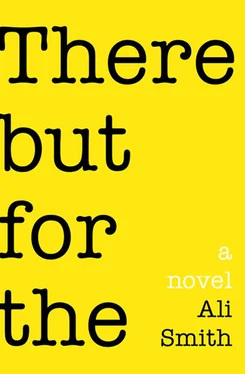She thought of all the children, literally thousands of them, the same age as that child, crossing the world by themselves right now.
She told herself, let it go.
She told herself she was no longer responsible.
She leaned back in the sunlight. She looked up. The summer sky was blue and full of swifts, lucky birds, world-travellers born with the knowledge hardwired into their nervous systems, by nature, of the routes they were about to fly over terrain they’d not yet even seen. The trees in the distance were lifting and waving their leaves, making the light and the dark of summer. These restless, thrashing new summers, the windy summers, the global-warming summers, were grey and sticky and flyblown, not like the summers she remembered from childhood, summers sweet and complete and enclosed, each held like a story already told, like a set of Chinese boxes holding all its predecessors all the way back to the first ever box, the first ever perfect summer, there inside it.
Ding-a dong, listen to it. Maybe it’s a bigot. Imagine remembering that after all these years. She should get in touch with Doug, send a Christmas card this year, ask him if he remembered it too. Where was Doug these days? She wondered if his parents were still living there, where they used to live. Then she wondered if his parents were still living.
Ding-a dong every hour, when you pick a flower. A world before Interim Dispersal Measures and Significant Knowledge Transfer. A time before weapons sales initiatives were called things like Peace. Words, words, words. Freedom. Identity. Security. Democracy. Human Rights. Deny your bin its rights.
She shook her head, because her head had started to hurt. The word redundant, which she’d heard in the mouth of that preternaturally articulate child, was beating inside her head. It made her think of a tablecloth, a placemat. It was a cheesecloth tablecloth and it had places on it where the food which had been spilled on it hadn’t washed fully out, had stained permanently. The tablemat, between her knife and fork, had a brown surround and an illustration of huntsmen on horseback jumping a hedge. This is where she was, at the dining-room table at dinnertime, and she was a small child and it was the day her mother had come home from her work at the Telephone Exchange and told them all that she was to be “made redundant” by Grace.
Who was this Grace, who could upend dinnertime, bring her mother to the verge of tears and her father to such paleness? Anna had wanted to know. But Grace wasn’t a person at all. Grace was a system — Group Routing And Changing Equipment — which meant that there would be less need for telephone operators, which was the thing her mother had always been, because people would from now on be able to dial abroad direct and would be put through automatically.
Anna sat on a wall in Greenwich nearly forty years later in the summer of the year 2009 and looked down at her shoes. They were trainers, and they were scuffed, and Genevieve Lee had looked at them in something like horror when Anna went up her clean stairs in them. Imagine if people decided at birth never ever to throw away any of the shoes they wore over the whole course of a life, and had a special cupboard where they kept all these old shoes they’d walked about the world in. What would there be in such a shoe museum, when you opened its doors? Row upon row, perfectly preserved, the exact shapes we took at certain points in our lives? Or row upon row, rack upon rack, of nothing but old soiled leather, old stale smell?
There was person after person, sitting in front of Anna, still in Anna’s head. They were from all over the world. They arrived by air, by sea, by lorry, in car boots, on foot. If they tried to enter the country invisibly their heartbeats could be detected (like the thirteen Afghanis and the two Iranians hidden in the lorryload of lightbulbs had been) by the special new detector sheds of which the Agency was very proud, and the brand new probes that could detect whether someone was breathing where he or she shouldn’t be.
A lot of the people Anna had seen had trouble speaking, either because of translation problems, or because a rain of blows had made them distrust words. Or both. Translation was sometimes itself a little rain of blows. How could what had happened to them be possible in one language, never mind be able to be retold in another?
In any language, it was almost always about what home was.
Anna had written it down in as shorthand a form as possible, what one man could remember of seeing his mother’s head being used by the border guards as a football. (This man was finally judged not credible.) Anna had written it down in as shorthand a form as possible, about the rooms one woman passed in the corridor, in which she could hear other people also being tortured, on her way to and from being tortured herself for seven months, daily, on different parts of her body by electric shock applied by the use of two small live electric wires which came out of the wall, like electric wires do, behind the chair she was made to sit in each time. For instance, hearing the voices of others being tortured was not as salient as being tortured yourself. The shock that came not from being tortured but from realizing that the wires were the exact same simple domestic wires that everybody who had electricity had in his or her house was not as salient either. (This woman had been pending judgement when Anna shifted career position.) Anna had written it down in as shorthand a form as possible, which was easy in this case, what the woman who had been a university professor said, it is like my chest stops and the words will not, just will not, who had proved unable to finish that sentence and say what it was that the words wouldn’t do, and about whom it was decided by Anna’s superiors that she couldn’t possibly be as clever as her summary indicated, being so demonstrably inarticulate. (This woman was finally judged not credible.)
You are really good at this, the area head had told her. You have exactly the right kind of absent presence. Best of all, your reports are 95 % word-length perfect.
Somewhere over the rainblow.
Anna Hardie was no longer responsible for the word-lengths which resulted in truth, credibility or redundancy.
She was out of there.
What would it be like, to be crouched, hidden, for thousands of miles in a dark lorry full of lightbulbs? Everything round you, to the sides of you, towering above you, would be light and fragile, cardboard and glass, and you would know, too, that each of the thousands of bulbs in the truck, heading blindly for a lightsocket somewhere, was held more secure, padded up in its box inside a box inside a box, and on its way to a surer destination, than you.
You would know yourself to be worth less than a lightbulb.
She put Miles Garth’s jacket over her head like she’d seen the tennis player do with the towel. It was hot in there, but momentarily soothing.
Then, after that moment, she felt stupid. She wondered if she looked, to passers-by, like someone in a special kind of deep purdah, or like an old-fashioned nun whose headdress thing was on the wrong way round, or like a mad person. You could only really put a jacket over your head if you were with friends and it looked like a jolly jape.
She wiped the sweat off her face into the silk lining of the jacket, then came back out into the world. Greenwich was full of people and nobody was looking at her; nobody had even noticed her putting a jacket over her head. But probably a CCTV somewhere had made a note of it.
To be noticed is to be loved. Who was it who’d said that, again? A novelist from the last century. Anna could spot, without even trying, three CCTV camera points from where she was sitting. She waved at the closest of the three, across the road on the wall of a derelict-looking office building. Hello. How like a brand new, insane sort of narcissism it would have seemed, this mad filming of ourselves all the time, had we had a preview of it even just twenty or thirty years ago. What a paranoid, jealousy-maddened love affair just walking down any street in a British city in 2009 resembled.
Читать дальше












